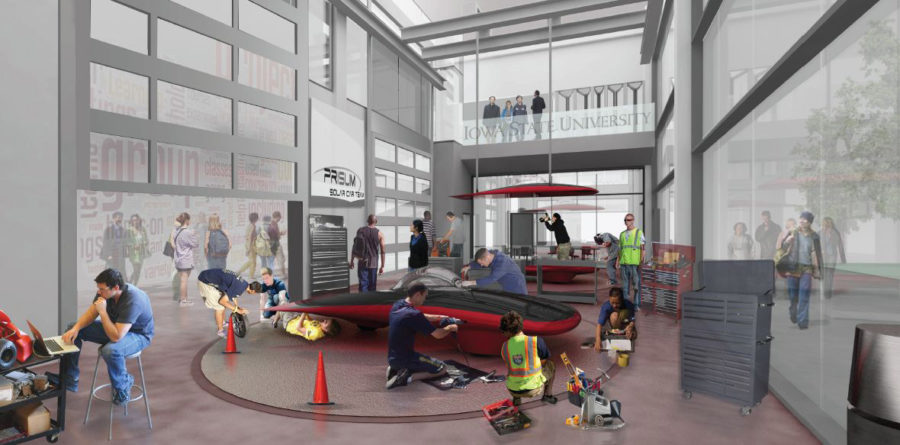ISU ‘hub for hands-on creativity’ awaits approval from Gov. Terry Branstad
The Student Innovation Center at Iowa State is awaiting approval from Gov. Branstad. If approved, the $80 million center will allow students from different disciplines to collaborate on a variety of projects.
June 9, 2015
The Student Innovation Center, a proposed new ISU facility born from a collaboration between the College of Design and the College of Engineering, is currently awaiting approval from Gov. Terry Branstad with the rest of Iowa’s state budget.
Luis Rico-Gutierrez, dean of the College of Design, describes the center as a “hub for hands-on creativity” with an emphasis on “making stuff.” It will serve as a space where students can work on projects with tangible and physical outcomes.
The proposed 175,000-square-foot center would be located near the Marston Water Tower where the Nuclear Engineering Laboratory and the parking lot east of the lab currently stand. The budget is estimated to be $80 million. Half of the money would come from the state, while the other half would be raised with private donations. An anonymous gift of $20 million has already been pledged for the project.
“There’s a lot of good work going around at the university trying to foster creativity and innovation in many different disciplines,” Rico-Gutierrez said. “This will allow us to move all that good work to the next level.”
Gary Mirka, associate dean for the College of Engineering, provided more details on the ways the facility could help students.
“I like to think about this facility in terms of three levels. There’s the curricular, co-curricular and extracurricular,” Mirka said. “Curricular has to do with building and designing as part of classes. Co-curricular deals with students organizations like the solar cars, the society of automotive engineers or the steel bridge team.”
Then we also have that third tier, and that’s extra-curricular. It doesn’t have anything to do with the class or a student organization, but really just freeform design. I think that this space will allow for that kind of activity as well,” he said.
The facility bridges the design and engineering disciplines, but will also provide a space to work for students of other majors.
“The building is an open invitation for every major in the university to come and participate,” Rico-Gutierrez said.
This emphasis on interdisciplinary cooperation can lead to students learning practical skills about teamwork in the real world.
“That’s the value. You get people from design and engineering working on the same problem but coming at it from a really different perspective, and bringing their skill sets and thought processes to bear on the project,” Mirka said.
Rico-Gutierrez said big businesses like Boeing or Apple bring design, technology and science together to create a better quality of life for people.
The colleges worked with Chicago-based company Cannon Design to flesh out the concept of the building. The idea and purpose of the facility is clear, but the building still has no approved design and construction has not started.
“The process of approval of the building is, rightly so, long and complicated,” Rico-Gutierrez said.
While the building has received support from the provost and legislature, it still awaits approval from Gov. Branstad.
“We’re hopeful that, in the next few weeks, Gov. Branstad is going to sign on the budget and will keep that as a priority,” Rico-Gutierrez said. “Once that is in place, then we will begin to plan the timeline from here onward.”







